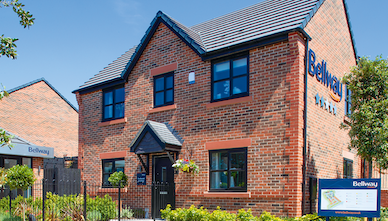Newcastle-based house building giant Bellway said its underlying profit before taxation rose by 22.5% to £650.4 million in the year to July 31, 2022, as revenue jumped 13.3% to a record £3.54 billion.
Total proposed dividend of 140p per share is an increase of 19.1%.
However, Bellway warned that the elevated demand experienced since the start of the pandemic has “moderated” and weekly reservations fell 12.4% to 191 per week in the nine weeks since August 1.
“While Bellway entered the year with a strong forward order book, given the backdrop of rising interest rates and wider economic uncertainty, the board currently expects to deliver volume at a similar level to the prior year,” said Bellway.
“The final outturn will be dependent on the autumn and spring selling seasons …”
Housing completions grew 10.5% during the year to a record 11,198 homes.
“In total, our overall land bank, comprising 97,706 plots (2021 – 86,571 plots, 2020 – 72,361 plots), provides scope to increase the number of sales outlets in the second half of the current financial year and beyond, notwithstanding ongoing sector-wide delays in the planning system,” said Bellway.
“The strengthened overall land bank enables the group to reinforce its disciplined financial land buying criteria in the year ahead, while retaining its long-term capacity to grow volume output to over 16,000 homes per annum.”
Bellway CEO Jason Honeyman said: “Bellway has delivered another strong performance.
“Our strengthened land bank and resilient balance sheet provide a platform for long-term growth and, importantly, during a period of economic uncertainty, they enable the group to take a more cautious approach to land investment in the year ahead.
“Our long-term model is our strength and is supported by an underlying demand for new homes.
“Bellway’s growth will continue to be disciplined as we maintain a clear focus on the high standard of our product, margin, quality of profit and value creation.”
REACTION:
Richard Hunter, head of markets at Interactive Investor: “Bellway is putting the building blocks in place to leave it flexible and well prepared for what is likely to be a demanding environment in the shorter term.
“Its focus on longer term planning should enable it to withstand a tougher housing market. For example, the group has increased its land bank over the period by 13% to over 97000 plots.
“Not only does this leave the company able to develop land at a pace commensurate with demand, but it also allows Bellway to be much more selective in land acquisition over the coming months.
“At the same time, it has increased its regional presence and deliberately lessened its reliance on London. This local knowledge has been beneficial in identifying new opportunities and, with a strong balance sheet, the financial powder is dry for the moment further acquisitions present themselves.
“The effect on most of the key metrics has been resolutely positive, as previously trailed in the full-year trading update in August. Revenues grew by 13% to a record level of £3.54 billion, underlying operating and pre-tax profit both jumped by 23%, while the underlying operating margin also rose comfortably to 18.5% from a previous 17%. At the same time, the Return on Capital Employed spiked to 19.4% from 16.9%, while strong forward sales also grew to stand at a value of £2.1 billion.
“Such cash generation has also enabled a further increase to the dividend, which now stands on a projected yield of a heady 7.7%. As with other housebuilders, the ability to pay shareholders to wait with an exceptionally attractive dividend income has been put in place partly to offset the wider challenges the sector has faced in terms of share price performance.
“Of course, Bellway is no exception to these ongoing challenges. The recent volatility in UK bond markets which has had a detrimental impact on mortgage availability, coupled with an increasingly pressed consumer in a deteriorating economic environment, has not played out well within the sector.
“Bellway points to the fact that mortgage availability is showing signs of strengthening following the government’s attempts to stabilise the market by reversing much of its previous spending plans, including some relief on stamp duty.
“However, the assistance of the Help to Buy scheme is fading quickly (16% of reservations involved Help to Buy in the period, compared to 30% last year and 40% the year previous), while the increase in social housing plots has reduced Bellway’s average selling price to £300000 from £314000 and there has been some moderation of demand as market volatility has reigned.
“At the same time, a recessionary and rising interest rate backdrop could well stall progress. Supply chain and inflationary pressures remain, as does the drag on pre-tax profits of a “net legacy building safety expense” totalling £346 million from the previous year’s level of 352 million, with the overall figure for these government fire safety rules around £500 million.
“As with its peers, the share price has reflected the half-glass empty outlook for prospects as opposed to the robust earnings which are continuing on the ground. For Bellway, this translates to a share price decline of 46% over the last year, as compared to a drop of 24% for the wider FTSE250.
“However, the bulls remain undeterred given the group’s strategic flexibility for growth, longer term planning underpinned by a robust balance sheet and previous experience of difficult economic periods. Indeed, the market consensus of the shares as a strong buy is reflective of the support which the company retains from potential investors, even if the share price disconnect is likely to stay in place for the time being.”
